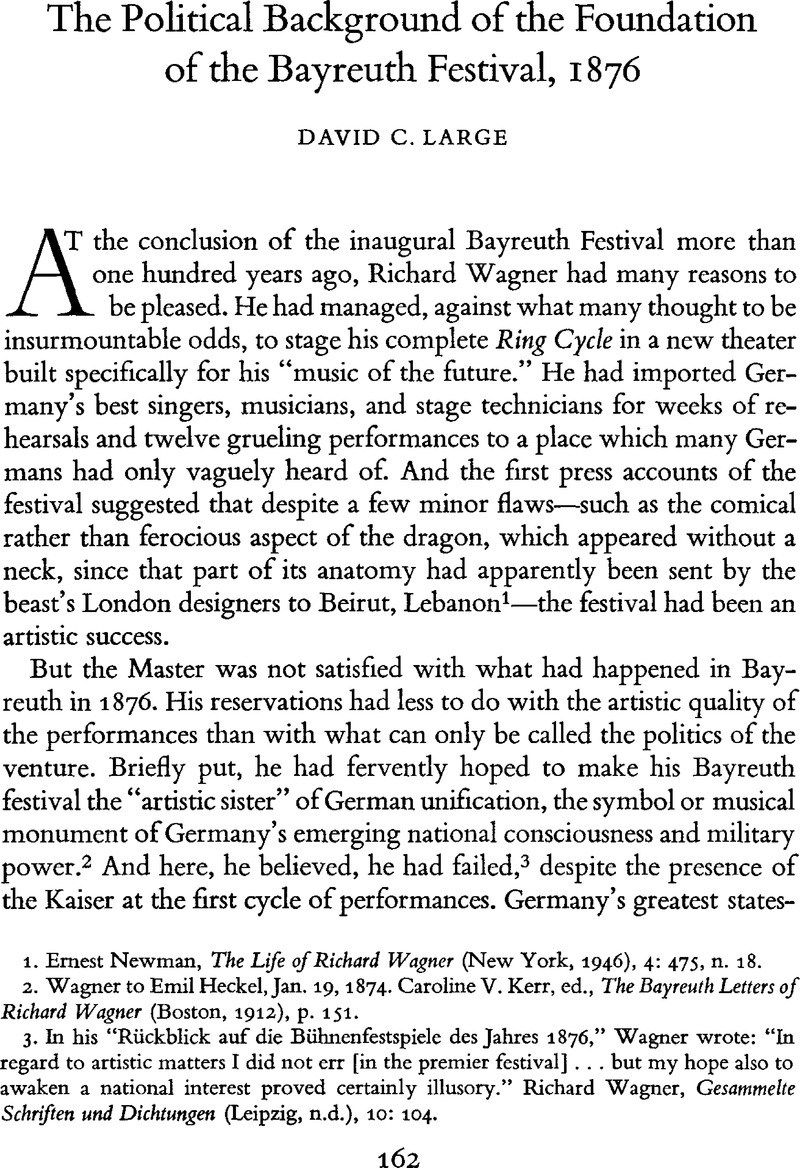Published online by Cambridge University Press: 16 December 2008

1. Newman, Ernest, The Life of Richard Wagner (New York, 1946), 4: 475, n. 18.Google Scholar
2. Wagner to Emil Heckel, Jan. 19, 1874. Kerr, Caroline V., ed., The Bayreuth Letters of Richard Wagner (Boston, 1912), p. 151.Google Scholar
3. In his “Rückblick auf die Bühnenfestspiele des Jahres 1876,” Wagner wrote: “In regard to artistic matters I did not err [in the premier festival] … but my hope also to awaken a national interest proved certainly illusory.” Wagner, Richard, Gesammelte Schriften und Dichtungen (Leipzig, n.d.), 10: 104.Google Scholar
4. Mayer, Hans, Richard Wagner in Bayreuth, 1876–1976 (New York, 1976), p. 37.Google Scholar
5. Newman, 4: 292.
6. Ibid., pp. 293–96.
7. Gutman, Robert W., Richard Wagner: The Man, His Mind, and His Music (Harmondsworth, England, 1971), pp. 342–69.Google Scholar
8. Ibid., pp. 374–75.
9. Ibid., p. 347.
10. von Westernhagen, Curt, “Wagner und das Reich,” in Strobel, Otto, ed., Schriften der Richard Wagner Forschungstätte (Karlsruhe, 1943), p. 46.Google Scholar
11. Ibid., p. 50; Gutman, p. 382.
12. Gutman, p. 376.
13. Wagner to Feustel, F., 06 14, 1877.Google Scholar Quoted in Karbaum, Michael, Studien zur Geschichte der Bayreuther Festspiele (Regensburg, 1976), p. 29.Google Scholar
14. Wagner's increasing disillusionment with Ludwig is vividly recorded in his wife's newly published diaries. For example, Richard told Cosima at one point that he regarded his dependence on Ludwig as an “unbearable disgrace.” Wagner, Cosima, Die Tagebücher (Munich, 1976), 1: 422.Google Scholar
15. Ibid., p. 38.
16. Westernhagen, pp. 52–53.
17. Newman, 4: 275–76.
18. Ibid., p. 280.
19. Wagner, Cosima, 1: 377–78.Google Scholar
20. Ibid., p. 384.
21. Ibid.
22. Richard told Cosima that despite its lack of concrete results, the meeting with Bismarck remained “of the highest value for me.” Ibid.
23. Marie von Schleinitz's efforts on behalf of Wagner are chronicled in her correspondence with Cosima Wagner. These letters are to be found in the Richard Wagner Archiv des Hauses Wahnfried. See also the obituary on Schleinitz by von Wollzogen, Hans in Bayreuther Blätter, 1912, p. 169.Google Scholar
24. On the Schleinitz salon see Schüler, Winifried, Der Bayreuther Kreis von seiner Entstehung bis zum Ausgang der Wilhelminischen Ära (Münster, 1971), p. 127.Google Scholar
25. Wagner, Cosima, 1: 1063.Google Scholar
26. The best source on the Wagner Clubs is Schüler, pp. 57–62.
27. This parallel is briefly explored in Karbaum, p. 19.
28. Ibid., pp. 31–32.
29. Wagner went out of his way to insult his most faithful supporters. The most notorious case of this is analyzed in Gay, Peter, “Hermann Levi: A Study in Service and Self-Hatred,” in Freud, Jews and Other Germans (New York, 1978), pp. 189–230.Google Scholar Cosima Wagner's diaries show that Wagner also resented his dependence on Jewish financial support through the Wagner Clubs. See Wagner, Cosima, 1: 486, 525.Google Scholar
30. Wagner, Cosima, 1: 629.Google Scholar
31. The Kaiser did, however, take out twenty-five subscriptions in his own name.
32. Wagner, Cosima, 1: 698.Google Scholar
33. Westernhagen, p. 60.
34. Wagner, Richard, Gesammelte Schriften, 10: 6.Google Scholar
35. Westernhagen delicately calls Bismarck's attitude toward Wagner “a certain personal prejudice.” Westernhagen, p. 61.
36. Gutman, p. 455.
37. Westernhagen, p. 61.
38. Wagner to Heckel, Jan. 19, 1874. The Bayreuth Letters, p. 152.
39. Westernhagen, p. 61.
40. Ibid.
41. The text of Ludwig's letter is quoted in Newman, 4: 408.
42. The Bayreuth Letters, p. 238.
43. Wagner, Cosima, 1: 964–65.Google Scholar Wagner told Cosima that “the very fact that only a man like Bismarck can help us shows that we are lost” (p. 966).
44. Ibid., p. 970.
45. Newman, 4: 415–19.
46. Mayer, Hans, pp. 25–38Google Scholar; Karbaum, Michael, p. 23.Google Scholar
47. Wagner, Cosima, 2: 41.Google Scholar
48. Eulenburg-Hertefeld, Philipp, Aus 50 Jahren (Berlin, 1923), p. 58.Google Scholar
49. On Wagner's financial situation after the first festival, see Mayer, pp. 40–42; Karbaum, pp. 25–31; Newman, 4: 540–43.
50. The best source on the political evolution of Bayreuth in the period between the first festival and the rise of Hitler is Schüler, Der Bayreuther Kreis.